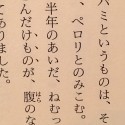Wired has recently published an interesting piece on the history of autocorrect. One important point the author brings up is that, though we seem to focus on the bad side of autocorrect, it certainly is an amazing achievement. That we often miss it probably has to do with the salience of the negative (over the positive), a phenomenon known as negativity bias. (Why can’t we be happy?) The author fleshes this particular case out a bit further:
Given how successful autocorrect is, how indispensable it has become, why do we stay so fixated on the errors? It’s not just because they represent unsolicited intrusions of nonsense into our glassy corporate memoranda. It goes beyond that. The possibility of linguistic communication is grounded in the fact of what some philosophers of language have called the principle of charity: The first step in a successful interpretation of an utterance is the belief that it somehow accords with the universe as we understand it. This means that we have a propensity to take a sort of ownership over even our errors, hoping for the possibility of meaning in even the most perverse string of letters. We feel honored to have a companion like autocorrect who trusts that, despite surface clumsiness or nonsense, inside us always smiles an articulate truth.
Here’s another snippet from the article I found particularly interesting:
A commenter on the Language Log blog recently mentioned hearing of an entire dialect in Asia based on phone cupertinos, where teens used the first suggestion from autocomplete instead of their chosen word, thus creating a slang that others couldn’t decode. (It’s similar to the Anglophone teenagers who, in a previous texting era, claimed to have replaced the term of approval cool with that of book because of happenstance T9 input priority.)
 Follow
Follow

